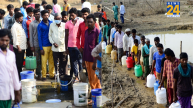New Delhi: African migrants have shared their terrifying experiences of being forced into remote desert areas when trying to cross the border into Tunisia. This comes as the European Union is planning to send a substantial sum of money to Tunisia as part of a migration deal worth €1 billion. Human rights groups are urging the EU to investigate allegations that Tunisian authorities have been pushing people into deserted border regions, often resulting in deadly outcomes.
Narrating their ordeal, migrants from sub-Saharan Africa claimed that many people have died of thirst as they attempt to cross the border. “They pushed me back three times to the desert, the last time at the end of July … The Tunisian border guards beat us, stole our money and cellphones. In the desert we had no water. I had to drink my own urine to survive”, Michael (38) hailing from Benin City, Nigeria told The Guardian.
Reports suggest that in July alone, Tunisian authorities relocated over 4,000 individuals to military buffer zones along the borders with Libya and Algeria. A source from an intergovernmental organization stated that about 1,200 people were pushed back to the Libyan border in the first week of July. By late August, the organization was aware of seven people who had died of thirst after being pushed back, while an NGO working with refugees estimates the number to be between 50 and 70, though this figure is unverified.
This information contradicts the statement made by Tunisia’s interior minister, Kamel Fekih, last month, who acknowledged the pushback of small groups of people but denied mistreatment or collective deportations. The situation is expected to intensify pressure on European lawmakers to address human rights concerns with Tunisian authorities, especially as they move forward with the migration deal.
The deal aims to curb irregular migration and has faced criticism, with the German foreign minister, Annalena Baerbock, expressing concerns about the consideration of human rights and the rule of law. Interviews with nearly 50 migrants revealed that many were indeed forcibly returned to the desert between late June and late July.
Reports of Tunisia forcing people into the desert began circulating in July when photos suggested that asylum seekers were dying of thirst and extreme heat after being pushed back by Tunisian authorities. Initially, Tunisia denied any wrongdoing, but they later acknowledged that some sub-Saharan migrants were being blocked on the Tunisian-Libyan border.
Italy’s interior ministry reports that over 78,000 people have arrived in Italy by crossing the Mediterranean from North Africa since the beginning of the year, more than double the number of arrivals compared to the same period in 2022. Most of these migrants, 42,719 to be exact, departed from Tunisia, making it the primary departure point. The EU’s partnership with Tunisia, signed in July, involves sending funds to combat human trafficking, secure borders, and support Tunisia’s economy, with the first payment of €127 million set to be disbursed soon.













